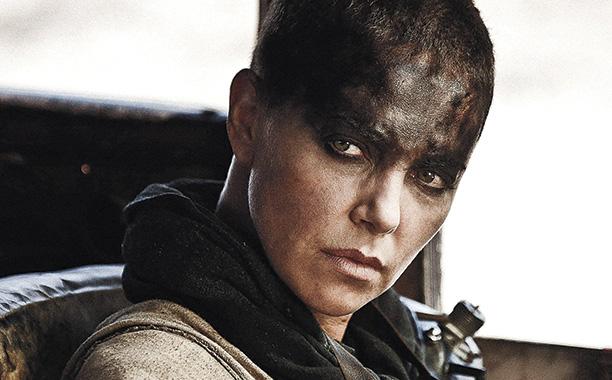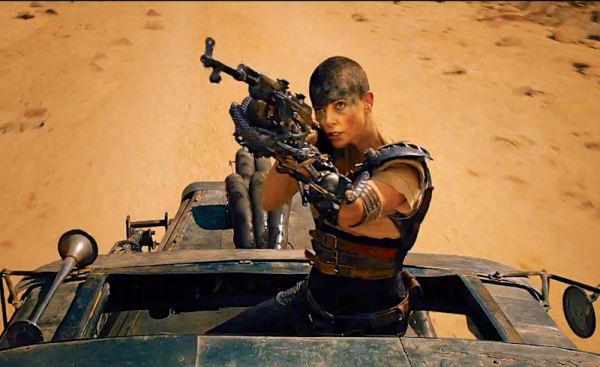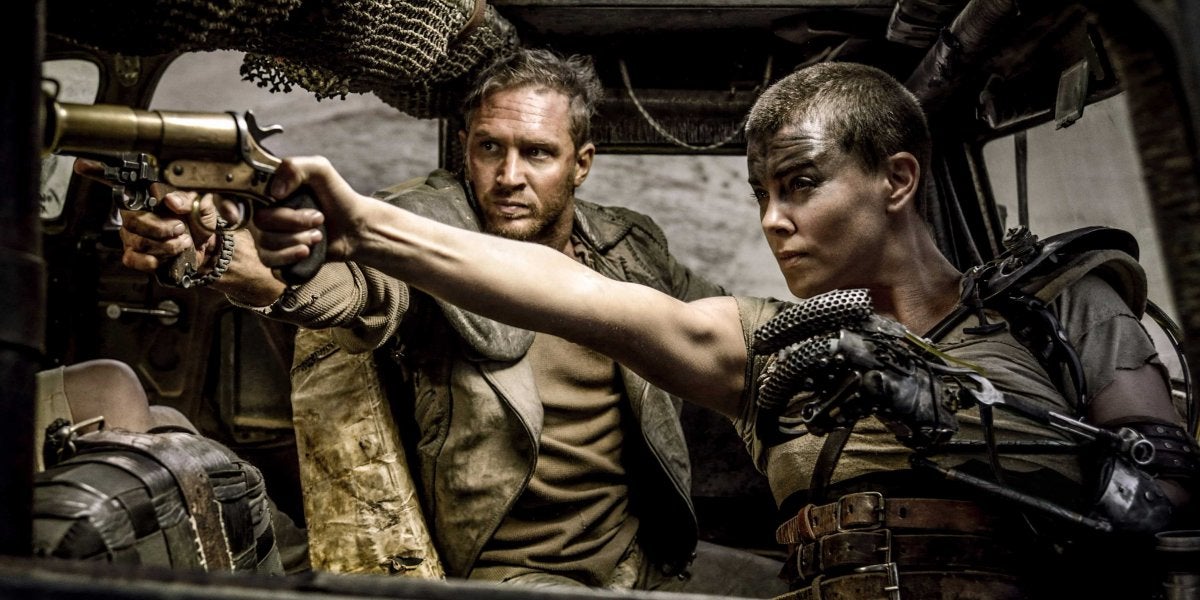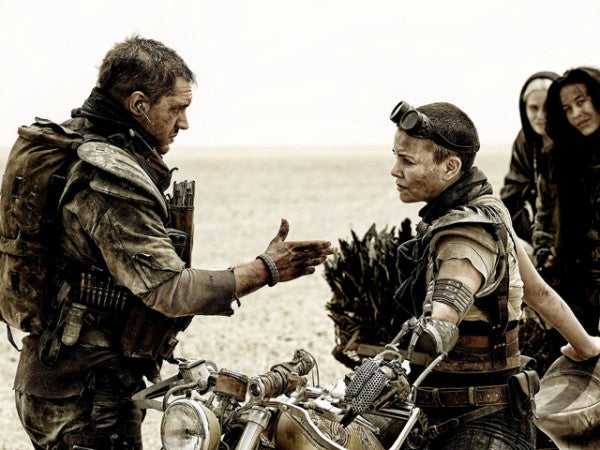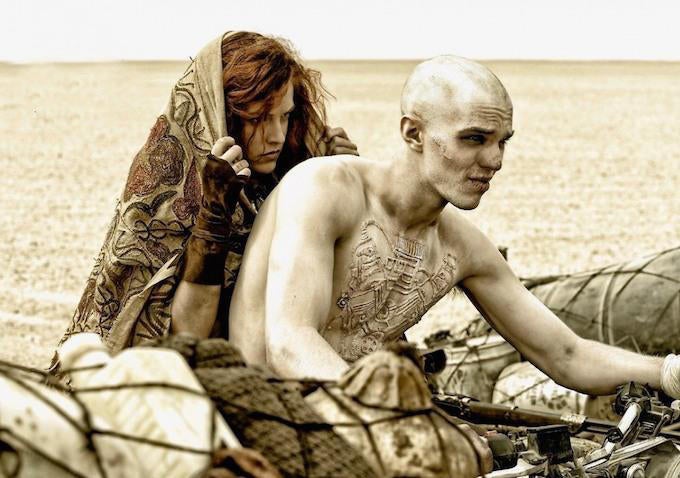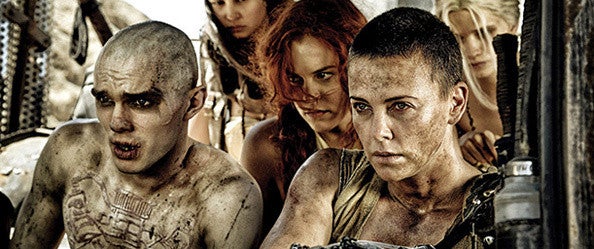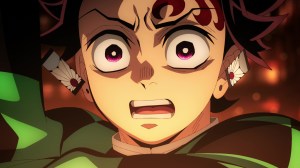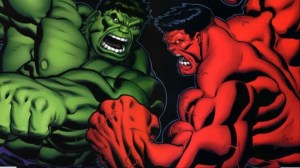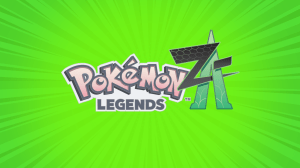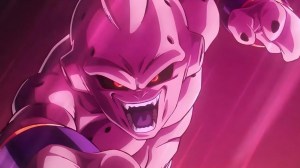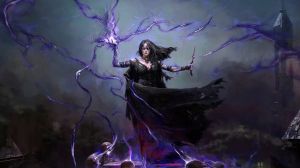*If you haven’t seen Mad Max: Fury Road, this article contains spoilers. Also, why haven’t you gone yet? Go! Go now!*
Videos by ComicBook.com
I fell in love with Mad Max: Fury Road the moment I saw it. It’s an incredible thrill ride featuring everything fans recall from The Road Warrior: fast cars, apocalyptic settings, and cardiac arresting-inducing action sequences. Then it takes all those elements a step further by infusing them with new life. There is no better example in 2015 of a pure cinematic vision, telling its story so well visually that dialogue is redundant. Fury Road is a perfect action movie filled with heroes and villains in a constant struggle, never ceasing to engage audiences. But “Mad” Max Rockatansky isn’t the hero of Fury Road.
That role belongs to Imperator Furiosa.
Yes, Max’s name is in the title and he’s there from start to finish. Yet the first time he even affects the plot is almost thirty minutes into the film’s runtime. Until then, he’s a muzzled hostage drug along by others. Max isn’t the character who drives the action, who infuses the film with its most potent themes, who follows the most dramatic character arc, or who achieves the greatest victory in Fury Road. All those claims belong to Furiosa.
Furiosa, played by Charlize Theron, initiates the film’s action by rebelling against Immortan Joe, stealing his five brides (read: sex slaves) and striking out into the desert in a war rig. She and her supporting cast of women, all of whom possess a clear personality and arc, are not only the cause of this story, but the ones driving it. The metaphor beneath their actions is not subtle: they are rebelling against the patriarchy. The Citadel, ruled by Joe, reveres him as a god and treats his sons and War Boys as the highest forms of life. Dirtied men and women lie beneath them begging for water and food. But they save the absolute worst treatment for the women. Joe does not even recognize his brides or the women he pumps breast milk from. He consistently refers to them as is property instead.
Furiosa and her companions’ rebellion is not only an escape, but a rejection of this notion. They repeat two core concepts throughout the film: “We are not things” and “Who killed the world?” Both seem like they should be obvious, but that is not the case to Joe. He and his War Boys all treat the brides like precious cargo. Much of their dialogue veers uncomfortably close to the manner men discuss porn and sex partners in our non-apocalyptic world. Even Furiosa’s power in Joe’s society as Imperator is undermined by the fact that she must serve Joe or die. Meanwhile, the question of who killed the world is perfectly clear. It’s the same people who keep making the world worse: men. Fury Road’s landscape is presented as the consequence of an economic reliance on oil and nuclear war–creations of our own patriarchal society.
There is hope created by Furiosa. She is aware of the Green Place, a paradise somewhere in the desert where Joe and his ilk do not rule. Her quest is archetypal, seeking out adventure and being changed by the journey. Ultimately Furiosa returns home, running a gauntlet composed of those who have ruled her life since she was a child. The centerpiece of the film comes not in escaping Joe, but in overthrowing his rule. Furiosa returns to the Citadel in order to change society, not to escape it. While old men like Joe are incapable of accepting this change and must die or face abandonment, the young war boys who remain are capable of accepting Furiosa as a leader and cheer her victory. Furiosa and the brides not only change themselves, but their world as well. They are the heart of Fury Road.
I won’t dive too deeply into the character arcs of Splendid, Capable, Toast, Dag, and Cheedo here. Each of them holds a significant place in the film though. They possess skills, talents, and desires that both drive the action and make them integral to the never-ending chase of Fury Road. They are not shuffled aside when bullets and fire fly, but actively contribute and shape the film. Splendid uses herself and her unborn child to shield Furiosa from Joe, being wise enough to know he would never kill her and brave enough to protect her friend. Even Cheedo, who regrets leaving Joe and tries to return at one point, is not presented as cowardly or villainous. She is frightened; her motives are naturally derived from years of sexual abuse. It is a natural response, handled by her friends and the film itself with compassion and understanding. Fury Road belongs to this group of five women as much as it does to Furiosa herself. They are partners supporting one another and the action of the film.
But it’s easy to understand why some may see Fury Road as Max’s movie, especially if you’re one half of the population. As a man, I tend to more readily identify with male characters. Our patriarchal society has taught me to see men as the heroes of stories because that’s typically how our culture presents men. That doesn’t just reflect my gender. Anyone raised in this male-dominated zeitgeist has been exposed to the same influences, to the point where even many women identify more easily with men.
If this comes as a surprise, take a cursory glance over the biggest franchises in Hollywood from Marvel movies to The Lord of the Rings to Star Wars. Who is the central hero in every one of the films? Who is the director in every one of these films? Who is the focus of marketing and merchandise in every one of these films?
Those are rhetorical questions (the answer is men).
That’s an assumption that is beginning to shift with big movies directed by women in the works at both Disney and Warner Brothers. Films like Ex Machina and It Follows are tackling audience identification and actively reflecting the ideology of their viewers. There’s still a very long road ahead though, which makes Fury Road such an exciting film.
It places a woman in the starring role of a franchise crammed full of testosterone, where she is a fully realized, feminine character, and provides full character arcs for all of the women who join her. It also provides a clear message to men about their role in feminism and making our society more just.
This is the message that hit me hardest, so much that I found myself tearing up several times as Fury Road ended. I recognize Furiosa as the protagonist, but it’s the tales of Max and Nux that speak most directly to my personal narrative and role in the film’s themes. Their story is one that ought to be examined.
Max enters the film as a true loner. He is unhinged from any one he has held dear and desires to live apart. His role does not reflect Joe’s patriarchal society, but someone who desires to abstain from and ignore problems that he does not consider his own. He only agrees to help Furiosa at first because he cannot escape Joe without her help. In the first half of the film, he treats women like competitors for survival, threatening and shooting at them multiple times. Only through shared experience does he learn to appreciate their talents and trust them.
Max’s pivotal moment comes after entering into an alliance and a sort of friendship with the women. When they arrive at the former Green Place (the revelation that leading Furiosa to realize you don’t discover a better world, you make it), the chase is over. Furiosa and Max need not rely on one another for survival. When Max sees Furiosa and her party journeying into the salt flats, he is not obliged to say or do anything for his own survival. Instead he opts to follow the group and offer them his advice and aid, if they choose to accept it. After explaining his plan, he extends an open hand to Furiosa and leaves the decision to her.
This is where the movie subverts Max’s introduction where he explains he has been reduced to the single instinct of survival. Max chooses to help others and put himself in harm’s way for the first time in Fury Road without his own interests in mind. It’s an offer of aid made with no expectation of reward. His friendship with Furiosa is based upon respect and trust, nothing more. That growth beyond his own self-serving motives is the point in the movie when Max becomes a true ally and someone worthy of admiration.
He cements his place as an ally at the end of Fury Road when he saves Furiosa’s life. After having lost a tremendous amount of blood battling Joe, Furiosa is on the verge of death. Max, a universal blood donor, freely gives a piece of himself to Furiosa, ensuring she will live. Max’s role as donor extends far beyond his blood type though. His journey allows him to lend help to those who need it and perceive sickness he can assist in healing.
Nux follows a more complex arc in Fury Road, beginning the film with fanatical devotion to Immortan Joe. When Joe glances his way, he’s exuberant and screams about the wonderful gift of recognition. He repeats the phrase “I live. I die. I live again.” with religious fervency as he attempts to detonate himself to stop the chase. He is the MRA or #Gamergate follower completely consumed by the misogynistic ideals of a charismatic leader. Nux is, in some ways, as much a victim of Joe’s patriarchy as the brides. He has been locked into a hyper-masculine lifestyle defined by violence, insensitivity, and the glorification of death.
Only when Nux plays a role in the death of Joe’s favored bride, Splendid, placing him permanently beyond Joe’s favor that he’s capable of change. Nux is discovered in a fetal position by Capable, who speaks to Nux and comforts him. It’s the first time that Nux has experienced empathy and a turning point for him. Rather than expose Nux to her companions, Capable allows him to remain hidden until Nux is able to help them.
Nux’s transformation is two-fold. Capable’s compassion offer him relief from the pain he is feeling, and it allows him to recognize flaws in Joe and his society. The hatred and objectification of people (women as sexual object and War Boys as soldiers) inherent in the Citadel’s patriarchy are shown to be meritless. The fanaticism that brought Nux low offers no real rewards, only an imagined afterlife.
Capable provides Nux something substantial and real in the present: friendship. The two comfort one another in the second half of the film. There are no sexual overtones, only gentleness that lacks in the rest of a very brutal film. Holding one another and providing cheek kisses stand out as moving acts of compassion against a bloody backdrop. Nux isn’t rewarded for helping the group through specific acts or a relationship. Instead, he discovers his friendship with a woman is its own reward, and learns the value of empathy.
The culmination of Nux’s story comes when he sacrifices himself to allow Capable to escape. It is a brave act, especially within the context of someone who recently lost faith in the afterlife. His transformation is summarized in the final shot when he looks forward at the women he has helped and extends his hand. It is a simple act of recognition. Nux points to her as the reason he is willing to sacrifice. Capable is the character whose decision allowed him to become a better more loving individual and his final act is to offer his hand in appreciation as he helps her achieve her own goals.
Max and Nux represent two types of men, those who don’t care about feminism and those who actively oppose. Both of their arcs follow the revelation that feminism is necessary not only for women, but for the creation of a better world. Furiosa’s cause results in the improvement of her own life and the bride’s, as well as the advancement of Max, Nux, and all of the Citadel. Her struggle for equality and self-determination is a rising tide, creating a better world for everyone.
Even Nux’s fellow War Boys, those too young to accompany Joe’s war party play into this at the end of the film. They are the next generation of men, neither enjoying Joe’s incredible power nor fully indoctrinated like Nux and the older War Boys. When Furiosa returns with Joe’s faceless corpse, they recognize her as a human being worthy of respect, not someone unlike themselves to be feared and objectified. They are the final men in the film to extend a hand, literally raising Furiosa, her companions, and the lower class upwards into Joe’s palace where they can rule the Citadel and work hand-in-hand with these young men.
When the women begin their ascension, Furiosa recognizes that one of them has left. Max is below them ready to disappear back into the crowd. They share a knowing glance of appreciation for one another, but there is no encouragement for Max to rejoin them. Both Furiosa and Max know that this is not his story. No reward is earned and none is requested. Furiosa’s ascension and the establishment of a more just Citadel is all the reward that ought to be required. Max’s wisdom comes in having always known that all he could and ought to do was help, and then move along.
Max, Nux, and the young war boys all present a heroic role for men in Fury Road, but they are not the protagonist of Fury Road. Both Max and Nux’s pivotal changes come when they decide to offer help to Furiosa and the brides. Nux reveals himself, threatening his own life, in order to help with the escape. Max races into the desert to offer assistance and an alternative plan. They choose to become actively involved in the women’s struggle, and to do so by offering assistance.
They do not take charge. They do not shout orders. They do not demean their allies.
They offer assistance. They provide advice. They support their friends.
This is the message that Fury Road holds for men in the audience. It is an incredible adventure about women seeking to establish justice for themselves in a world that does not view them as being equal. Max and Nux are allies in the cause, but they are not the focus. Their heroism comes in offering assistance and learning to empathize. Their arcs are defined by learning to offer aid without requiring a reward or central role.
Feminism isn’t about men. It’s not our story. It’s not about us. That doesn’t mean we don’t have an important role to play. Fury Road is a reminder that the best thing we can do is extend our hands and ask “How can I help?”
– – –
Want a chance to win a Batman Arkham Knight Playstation 4 Bundle? Click here or the image below to enter!
Good luck!


